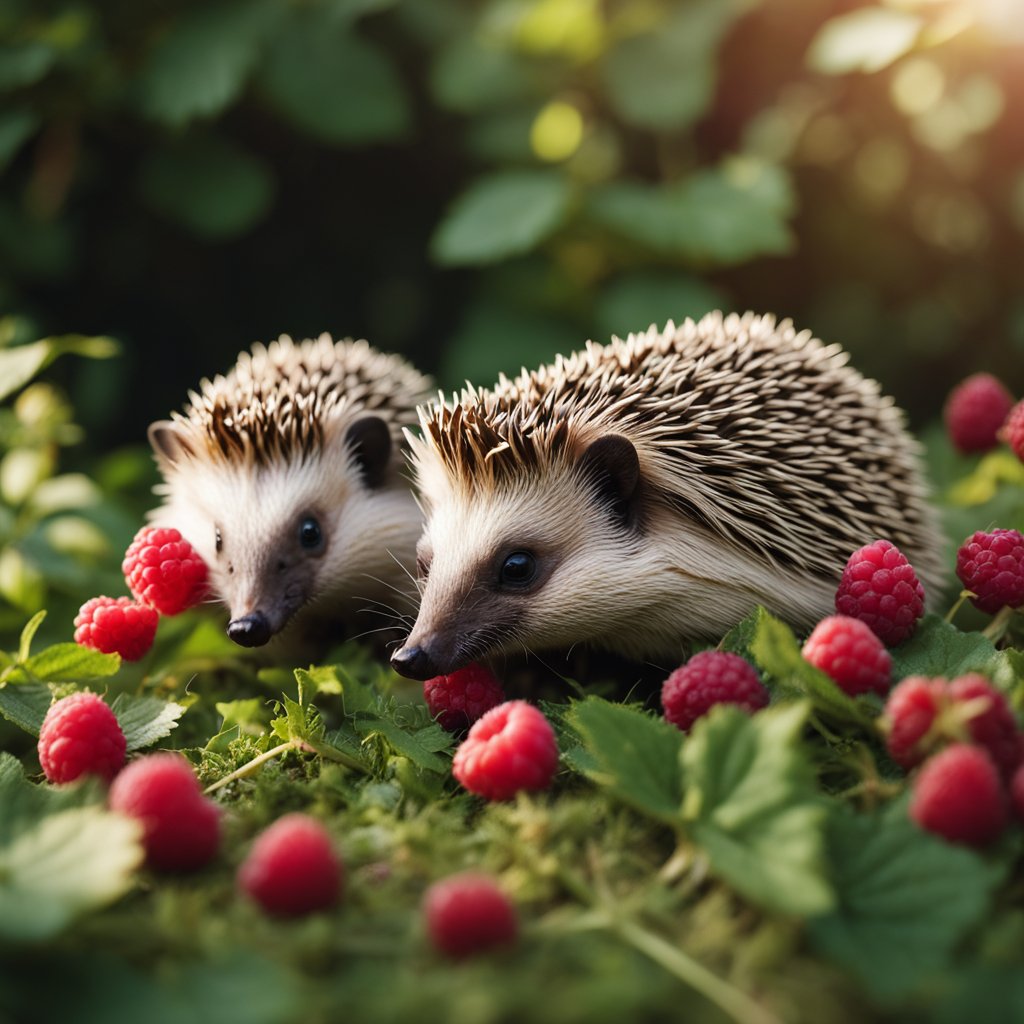Can Hedgehogs Eat Raspberries? A Comprehensive Guide
If you’re a hedgehog owner, you may be wondering what types of fruits and vegetables are safe to feed your pet. One fruit that you may be curious about is raspberries. Can hedgehogs eat raspberries? The answer is yes, but in moderation.
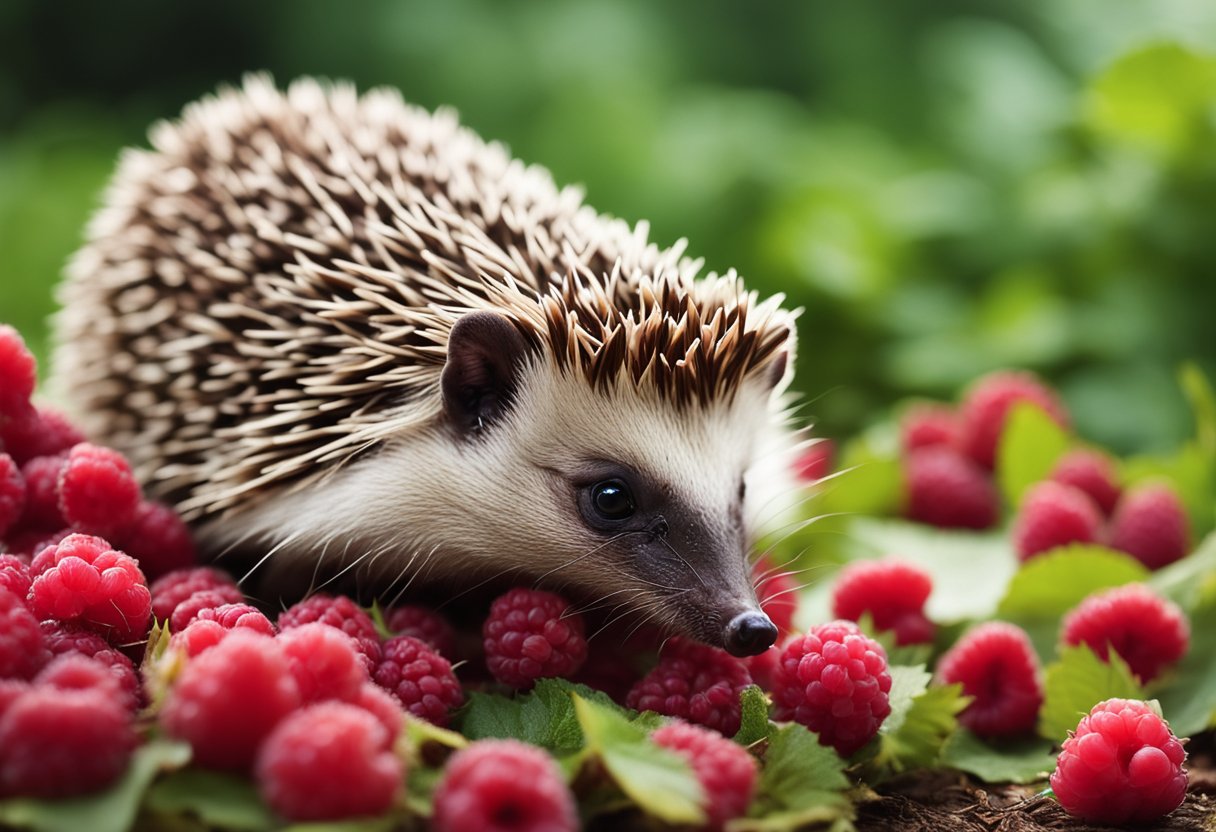
Hedgehogs have specific dietary needs, and it’s important to provide them with a balanced diet. While raspberries are safe for hedgehogs to eat, they should only be given as an occasional treat. Too many raspberries can cause digestive issues for your pet. It’s also important to wash the raspberries thoroughly before feeding them to your hedgehog to remove any pesticides or other harmful chemicals.
In addition to raspberries, there are many other fruits and vegetables that hedgehogs can eat. It’s important to do your research and ensure that you’re providing your pet with a healthy and balanced diet. By understanding your hedgehog’s dietary needs and providing them with a variety of safe foods, you can help ensure that they stay healthy and happy.
Key Takeaways
- Hedgehogs can eat raspberries, but only as an occasional treat.
- It’s important to wash raspberries thoroughly before feeding them to your hedgehog.
- Providing your hedgehog with a balanced diet is crucial for their health and well-being.
Hedgehog Dietary Basics
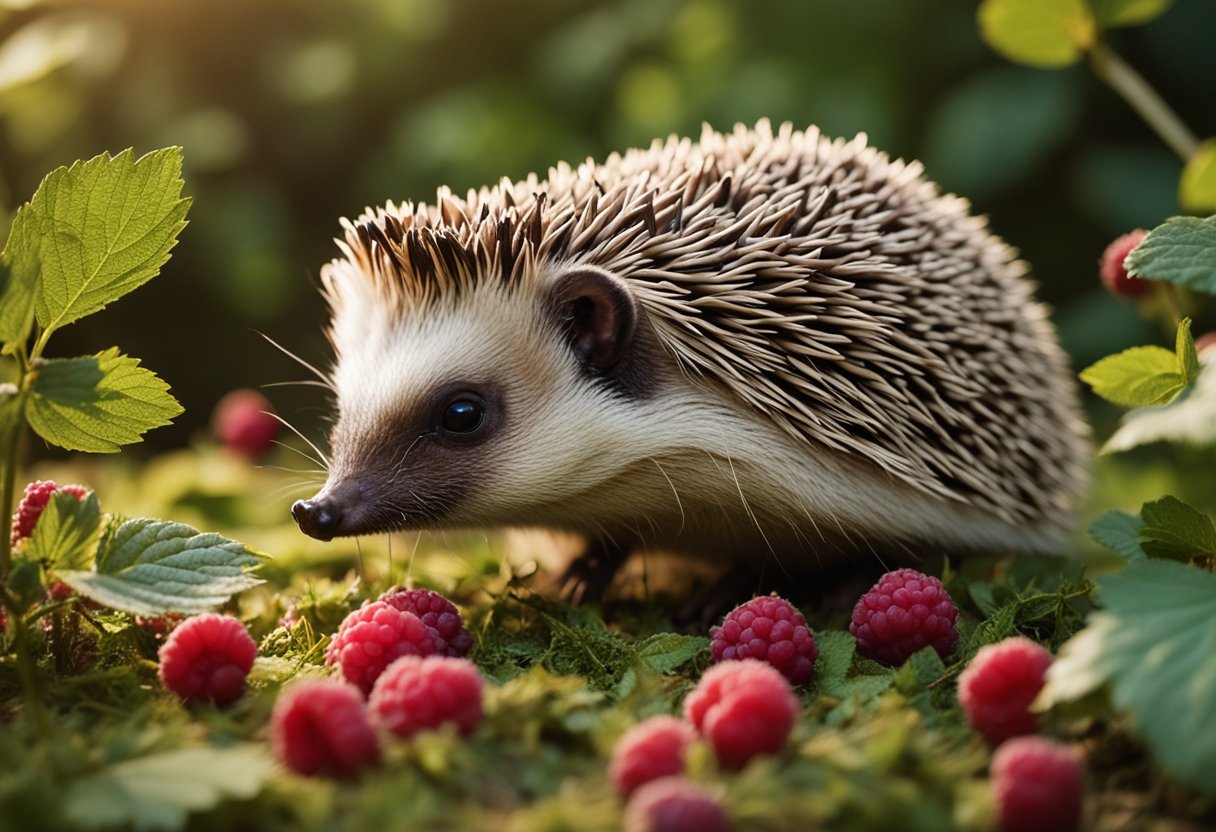
Hedgehogs are insectivores, which means they primarily eat insects and other small invertebrates. However, they also enjoy fruits and vegetables as occasional treats. It is important to provide your hedgehog with a balanced diet that meets their nutritional needs.
Nutritional Needs of Hedgehogs
Hedgehogs require a diet that is high in protein and low in fat. They also need a source of fiber to aid in digestion. A balanced diet for a hedgehog should consist of:
- High-quality commercial hedgehog food: This provides a good source of protein and other essential nutrients.
- Insects: Live insects such as mealworms, crickets, and waxworms are a great source of protein and fiber for hedgehogs.
- Vegetables: Hedgehogs can eat a variety of vegetables such as carrots, peas, and green beans. These should be given in moderation.
- Fruits: Fruits such as apples, bananas, and berries can be given as occasional treats. However, fruits should not make up a large part of a hedgehog’s diet as they are high in sugar.
Safe Foods for Hedgehogs
Not all foods are safe for hedgehogs to eat. Here are some foods that should be avoided:
- Dairy products: Hedgehogs are lactose intolerant and cannot digest dairy products.
- Nuts: Nuts can be a choking hazard and are high in fat.
- Citrus fruits: Citrus fruits can cause mouth sores and digestive upset in hedgehogs.
- Onions and garlic: These foods can cause anemia in hedgehogs.
It is important to research the foods you plan to feed your hedgehog to ensure they are safe and provide the necessary nutrients. Always introduce new foods slowly and in small quantities to avoid digestive upset.
Raspberries and Hedgehogs
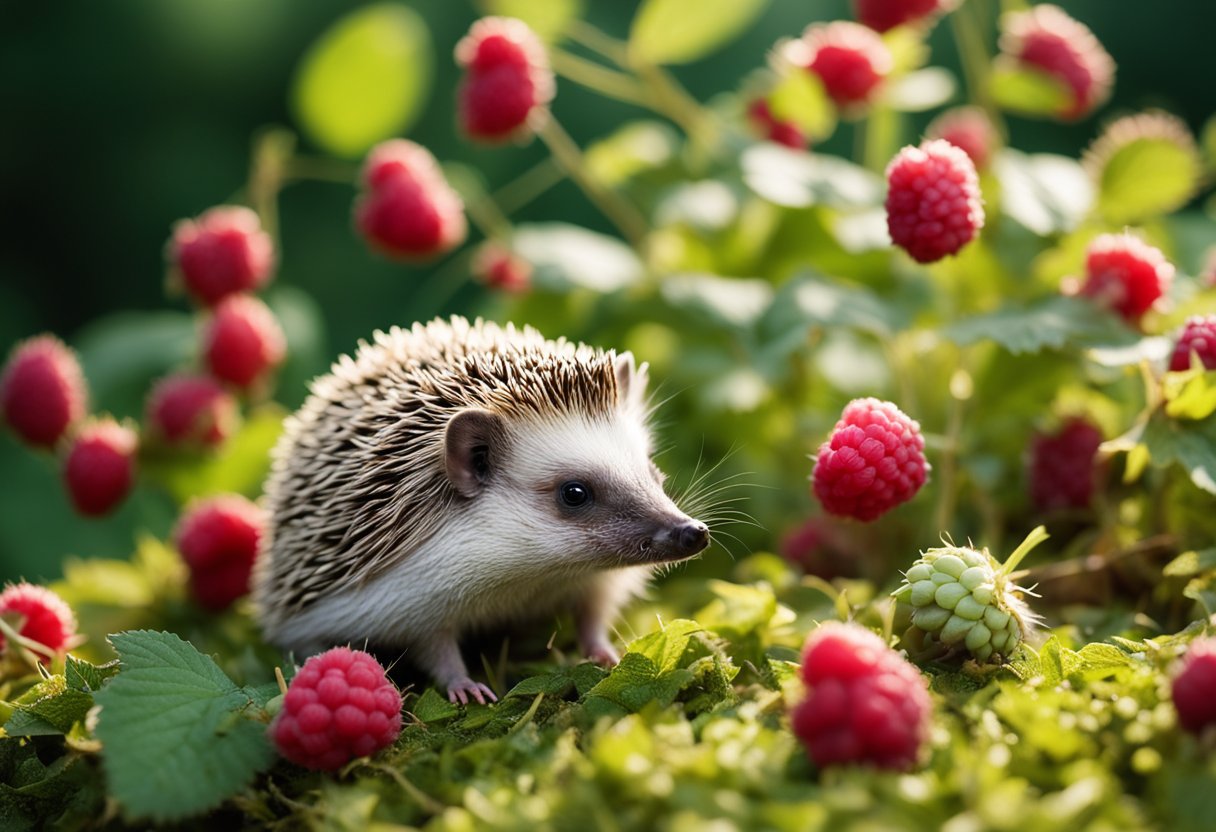
If you’re a hedgehog owner, you might be wondering if raspberries are a safe and healthy treat for your pet. The good news is that raspberries are safe for hedgehogs to eat in moderation. However, there are some things you need to keep in mind before you start feeding your hedgehog raspberries.
Benefits of Raspberries for Hedgehogs
Raspberries are a good source of vitamins and minerals that can benefit your hedgehog’s health. They contain vitamin C, which is important for immune system function, and vitamin K, which helps with blood clotting. Raspberries also contain fiber, which can help regulate your hedgehog’s digestion.
Potential Risks of Feeding Raspberries
While raspberries are generally safe for hedgehogs to eat, there are some potential risks to keep in mind. Raspberries are high in sugar, which can cause weight gain and dental problems if fed in excess. Additionally, raspberries are acidic, which can cause stomach upset in some hedgehogs.
Feeding Guidelines for Raspberries
If you want to feed your hedgehog raspberries, it’s important to do so in moderation. A few raspberries a week should be enough to give your hedgehog a tasty treat without overloading them with sugar. You should also make sure to wash the raspberries thoroughly before feeding them to your hedgehog to remove any pesticides or other contaminants. Finally, if you notice any signs of digestive upset or other health problems after feeding your hedgehog raspberries, stop feeding them immediately and consult with a veterinarian.
Resources
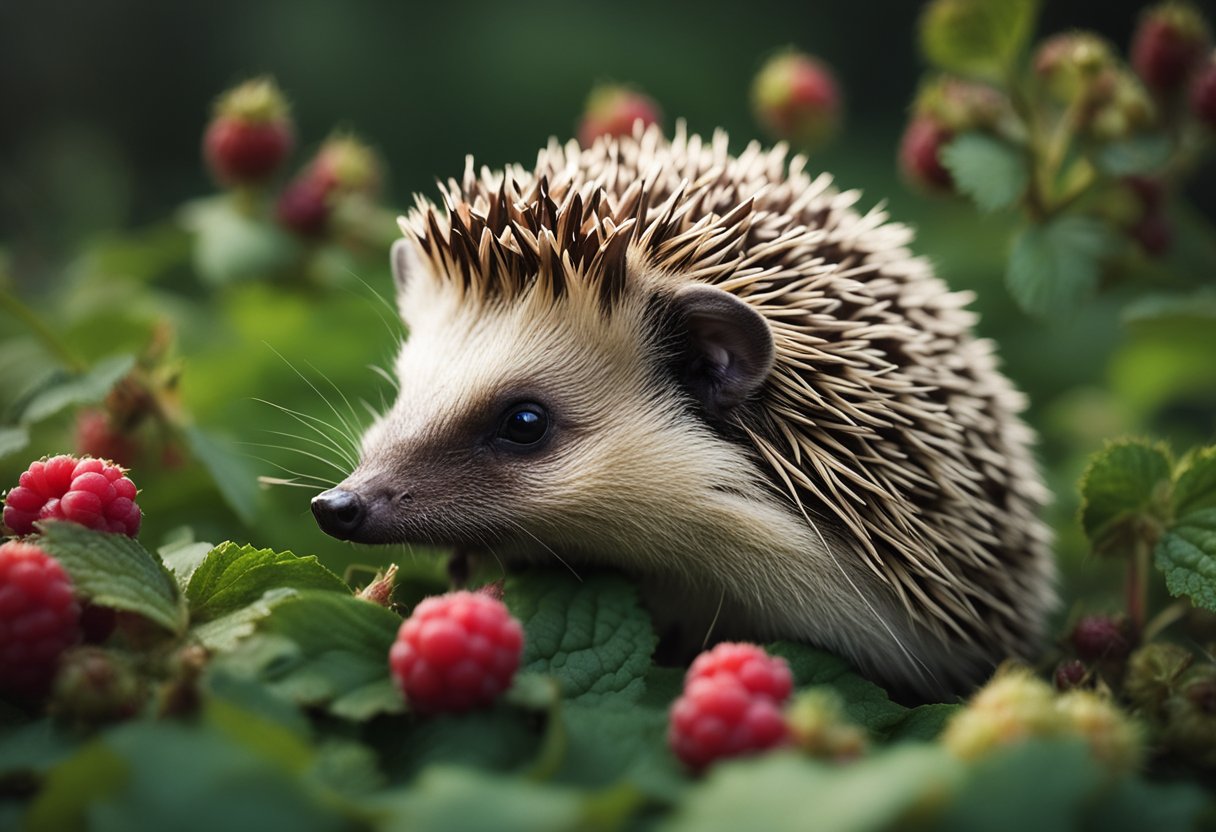
If you’re considering feeding your hedgehog raspberries, it’s important to know how much and how often they should eat them. While raspberries are generally safe for hedgehogs to eat, they should only be given as an occasional treat. According to Pet Keen, it’s best to limit your hedgehog’s intake to no more than one or two raspberries per week.
It’s also important to note that raspberries should not make up a significant portion of your hedgehog’s diet. Hedgehogs are primarily insectivores, so the bulk of their diet should consist of high-quality, protein-rich foods such as insects, lean meats, and specially formulated hedgehog food. According to the Hedgehog Registry, hedgehogs can also enjoy a variety of fruits and vegetables, including apples, bananas, blueberries, strawberries, watermelon, and more.
When offering raspberries to your hedgehog, it’s important to wash them thoroughly and remove any stems or leaves. You may also want to consider cutting them into small pieces to make them easier for your hedgehog to eat. If your hedgehog shows any signs of digestive upset after eating raspberries, such as diarrhea or vomiting, you should discontinue feeding them this fruit.
In addition to raspberries, there are many other fruits and vegetables that hedgehogs can enjoy as part of a balanced diet. For more information on what hedgehogs can and can’t eat, check out the Hedgehog Registry’s guide to hedgehog food.
Conclusion
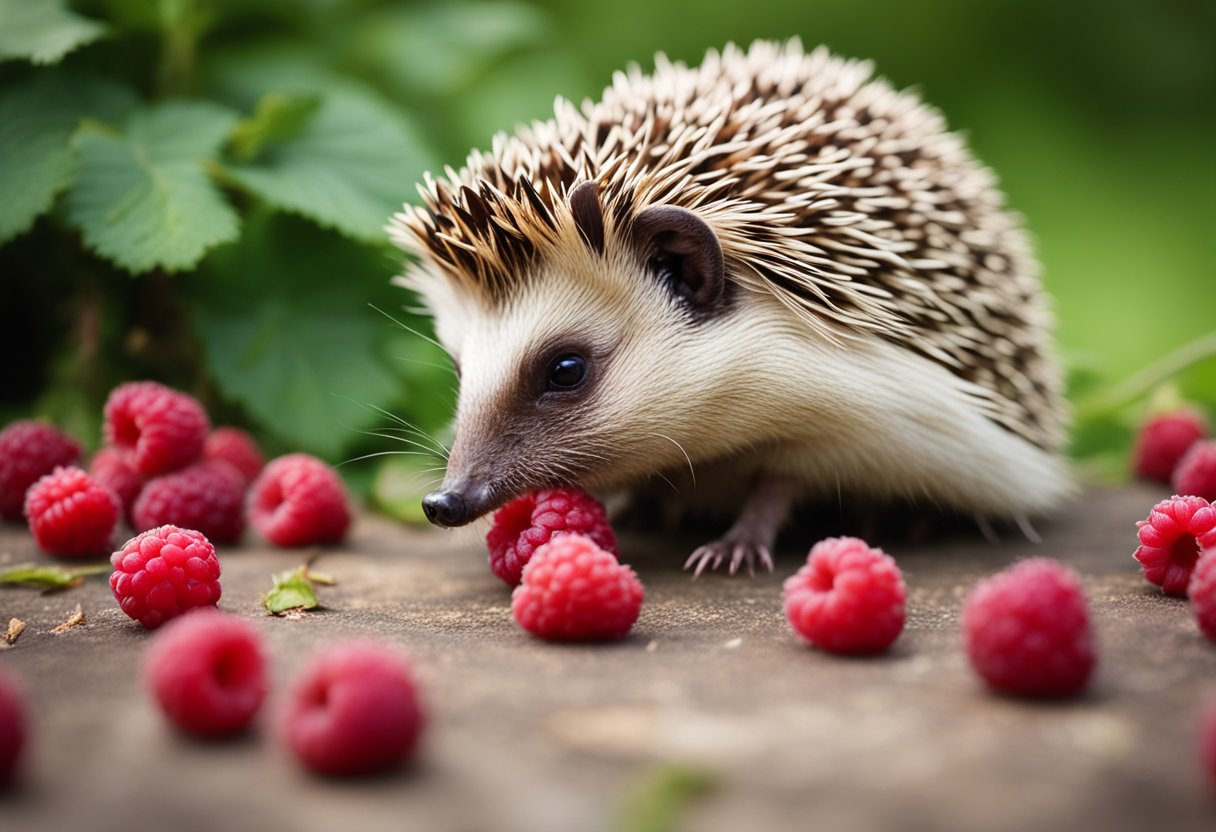
In conclusion, raspberries can be a tasty treat for your hedgehog, but you should only give them as occasional treats. Hedgehogs can indeed enjoy the sweet, juicy delight of raspberries alongside a variety of other fruits like apples, bananas, blueberries, and more. However, it is important to remember that these fruits should not comprise the majority of their diet. A well-balanced diet with high-quality hedgehog food and insects is essential for their overall health and well-being.
Remember that hedgehogs are insectivores, and their diet should primarily consist of insects. Insects like crickets, mealworms, and waxworms are excellent sources of protein and other essential nutrients. Additionally, hedgehogs require a high-fiber diet to maintain healthy digestion. You can provide them with fiber-rich foods like carrots, sweet potatoes, and leafy greens.
It is also important to note that hedgehogs have specific dietary needs that vary depending on their age and health condition. Therefore, it is recommended to consult with a veterinarian who specializes in exotic animals to ensure that your hedgehog is receiving proper nutrition.
By providing a well-balanced diet with occasional treats like raspberries, you can ensure that your hedgehog remains healthy and happy for years to come.
Frequently Asked Questions
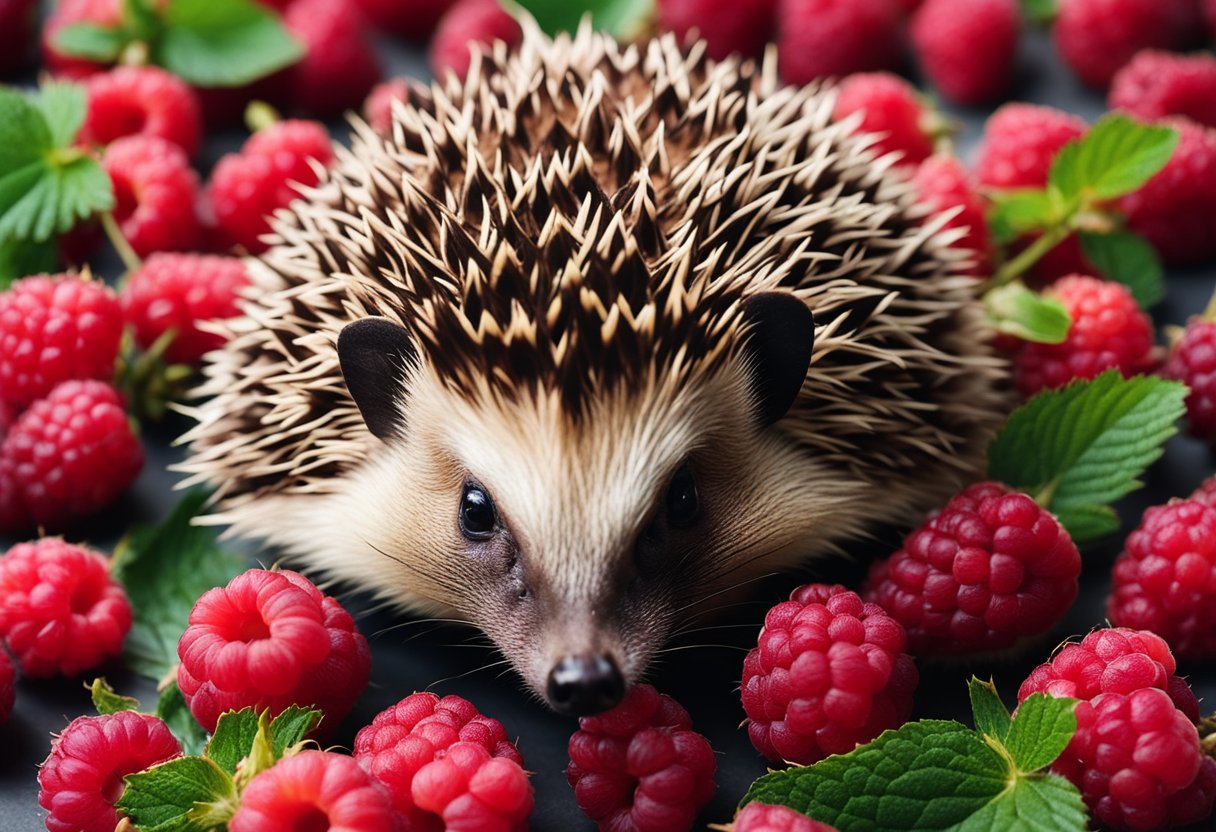
Are raspberries safe for hedgehogs to consume?
Yes, raspberries are safe for hedgehogs to consume. According to PetKeen, raspberries can be a tasty treat for your hedgehog, but you should only give them as occasional treats. It is important to thoroughly wash the raspberries before serving them to remove any pesticides or harmful chemicals.
What are the risks of feeding hedgehogs raspberry seeds?
Raspberry seeds are small and can easily get stuck in a hedgehog’s teeth or throat, which can cause choking. Therefore, it is best to remove the seeds before feeding raspberries to your hedgehog. As ExoPetGuides suggests, if the raspberries are bigger than your hedgehog’s mouth, be sure to further reduce the size to make them easily consumable.
Is it okay for hedgehogs to eat other berries, such as blackberries or blueberries?
Yes, hedgehogs can eat other berries like blackberries and blueberries. In fact, most of the berries that are available as fruits are able to be fed to your hedgehogs. As Chef’s Resource suggests, make sure to thoroughly wash the berries before serving them to remove any pesticides or harmful chemicals.
What fruits should be avoided when feeding hedgehogs?
While hedgehogs can eat a variety of fruits, there are some that should be avoided. According to Hedgehogs Hub, fruits that are high in citric acid, such as oranges and lemons, should be avoided as they can cause mouth sores. Additionally, fruits that are high in sugar, such as grapes and raisins, should be avoided as they can cause obesity and other health problems.
Which fruits are considered a hedgehog’s favorite?
Hedgehogs have a sweet tooth and enjoy fruits that are sweet and juicy. Some of their favorite fruits include strawberries, raspberries, blackberries, and blueberries. As VoyoPets suggests, raspberries, packed with vitamins and antioxidants, seem like a wholesome treat. Hedgehogs can nibble on them for a boost of nutrients, particularly vitamin C.
What are some common foods that are harmful to hedgehogs?
Some common foods that are harmful to hedgehogs include chocolate, caffeine, alcohol, and fatty foods. These foods can cause digestive problems, obesity, and other health issues. It is important to stick to a balanced diet for your hedgehog and avoid giving them any human food unless it has been confirmed safe for them to consume.
